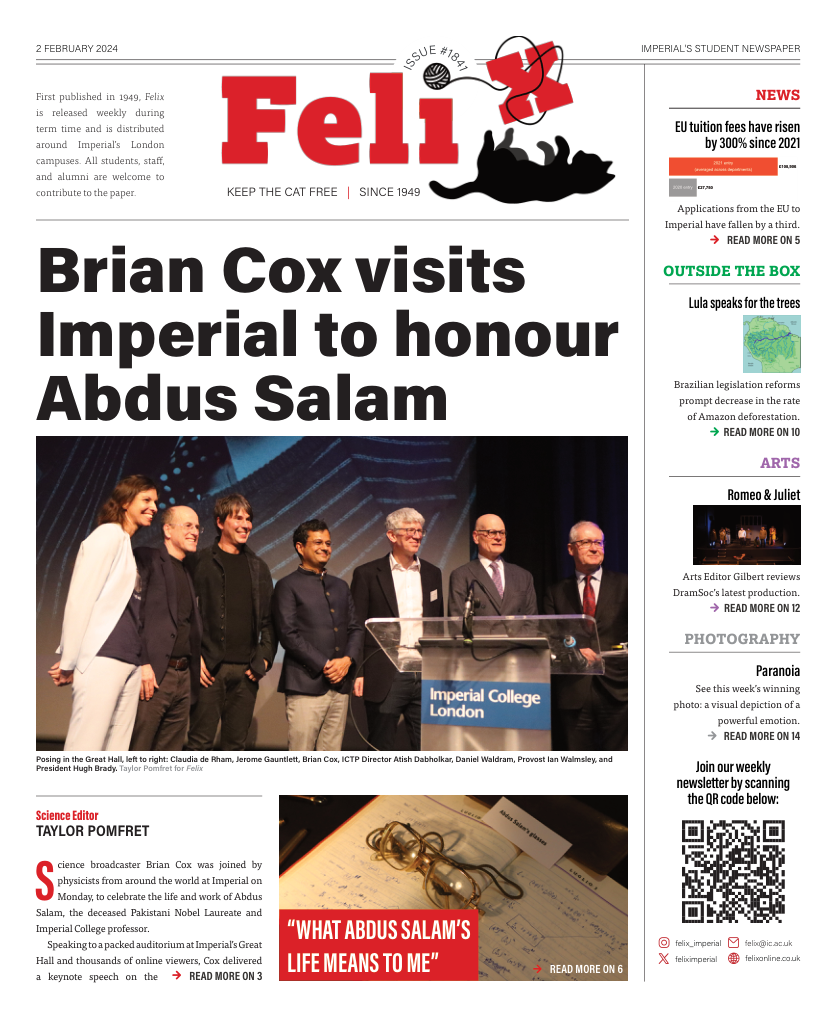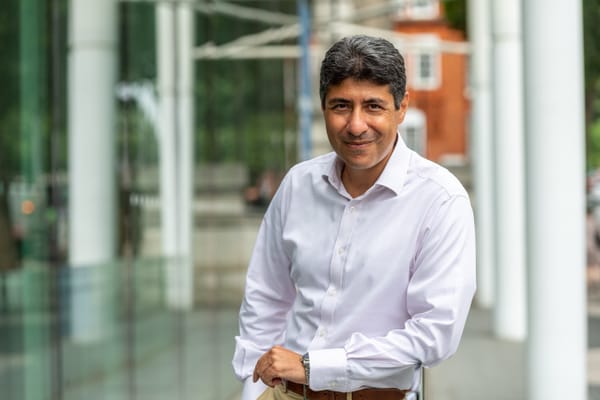‘Deer’ Imperial, Why not go vegan?
Felix investigates what vegan Imperial students think about food availability and sustainability on campus.
As part of Imperial’s Sustainable Food and Drink Policy, beef will soon be replaced by wild culled venison starting at Queens Tower Rooms and SCR Restaurant. According to the Imperial’s Sustainable Food and Drink Policy, the amount of beef served at College catering outlets has already reduced by 47% since 2017. Taste Imperial plan to reduce it further by 35% every year until no beef is served in 2025-26. Moving to venison forms part of this plan, but vegans at Imperial wonder why Imperial is not replacing beef with more plant-based food. Ironically, the switch from beef to venison was announced during Veganuary.

Beef and dairy are the two largest sources of carbon emissions in an average British person’s diet.. Cattle farming emits around 65 kilograms of carbon dioxide equivalent (tCO2e) for every kilogram of beef. Venison or deer meat, is a lean meat hailed as a sustainable alternative to beef. Not only does venison emit 38% less carbon dioxide equivalent than beef, but killing a wild deer prevents its future emissions. However, the UK slaughters more cows each year than our whole deer population – so replacing beef with venison is not feasible nationwide.
Venison is also more sustainable than beef because deer are culled to control their population. There are at least 1.5 million deer in the UK - a 1000 year high – partly because climate change has made winters warm enough for more deer to survive. Since humans drove the natural predators of deer extinct, humans must now act as their predators to maintain ecosystem balance. Reforestation Scotland cites deer overpopulation and overgrazing as the biggest threat to their reforestation efforts. In theory, Taste Imperial is moving from serving animals killed especially to feed people to serving animals that are killed anyway to preserve ecosystems.
Notably, Taste Imperial will still be serving animals.
Vegan Imperial students argue that since plant-based food is healthier, better for the planet, and more ethical than any kind of meat, Imperial should be replacing beef with vegan proteins like tofu and lentils.
Is vegan food better for the planet?
According to an Intergovernmental Panel on Climate Change report, food accounts for 21-37% of global emissions. The same report was the first to analyse demand-side reductions, concluding that changes we make to our diets can have a bigger impact than any other end use sector. In fact, a 2020 study by Michael Clark and colleagues showed that humanity will spend our carbon budgets for 1.5°C and over two-thirds of our 2.0° C budget on food alone with our current diets.
Raising animals emits much more than their transport, retail, or packaging. Beef emits about 20 times more carbon than tofu and about 150 times more than root vegetables according to a 2018 study. A 2020 study by Kim and colleagues found that going vegan in the UK, where the average person emits about 2 tCO2e per year, can reduce someone’s emissions from food by 80%. The UK sits at 13th in the world for per capita food emissions, giving us a real reason to change quickly. Being a well-respected institution, Imperial and its students could lead the country in changing diets.
The UN Food and Agriculture Organisation reported that 77% of agricultural land globally is used to raise or feed livestock, even though it produces only 18% of global calories and 37% of global protein supply. This makes reducing meat and dairy consumption one of the most feasible and impactful ways of addressing deforestation, feeding a growing population, and improving biodiversity
According to both the American and British Dietetic Associations, vegan diets support healthy living at every age and life stage, so there is no reason to worry about eating more plants. Red meat – including venison – is a Class 2A carcinogen, so should not be eaten in excessive amounts anyway
Sources here.
Imperial from the vegan perspective
Despite the benefits of going plant-based, vegans are a minority of students on campus. Felix surveyed students who are vegan or participated in Veganuary this year what they think about Imperial’s catering. 16 students and one recent graduate filled in the survey.
Overall, students felt neutral about the availability and positively about the taste of vegan food on campus. Plantworks received very positive reviews for both availability and taste. Students commended how more vegan cakes are being served on South Kensington and Charing Cross campuses than before, and how Silwood Park serves delicious fake fish and chips. The lowest rated outlets for vegan food were Library Cafe and Neo Pizza and Pasta for both taste and availability.
Like the food being served, Imperial’s Sustainable Food and Drink Policy was met with mixed reviews. Most respondents applauded the decisions to make non-dairy milk confer no extra charge and to phase out beef by 2025-26. Replacing beef with venison received less praise. Some students used words like “tragic” and “ridiculous”, while another asked Taste Imperial “what were they thinking”. 35% of students recognised that venison is the best of the meat options but said they would prefer plant-based food. For example, a fourth-year computing student called venison “a necessary evil”. Taste Imperial also pledged that any livestock served would meet Red Tractor Assured Standards and any fish would be Marine Stewardship Council certified. 70% of respondents were sceptical of at least one of these certifications – for reasons including being “difficult to fact check”, “horrible conditions” at certified farms, and the criteria not being robust enough.
In response, Jane Neary, Director of Campus Operations, said to Felix: “Imperial has taken positive steps in recent years to improve the availability of vegan food on our campuses, as shown through the successful launch of Plantworks, the increase of plant-based alternatives across our campuses, and our commitment to make all non-dairy milks available at no extra charge.
“As a large institution, we need to cater for those who wish to continue eating meat. Whilst there are certain ‘red lines’ for us - not least the continued serving of beef - there are other areas where we instead will prioritise an alternative that is more sustainable. The serving of venison, for example, is a pragmatic choice given its considerably reduced carbon footprint.”
Student Union Environment & Sustainability Forum gives vegans a voice
On 25th January, Deputy President (Finance and Services) Stephanie Yeung hosted representatives from Plant-Based Universities (PBU) Imperial for a vegan-themed Environment & Sustainability Forum. Representatives explained that PBU is a student-led initiative aiming for universities across the UK and Europe to have 100% plant-based catering. They thought it was “hypocritical” for universities to research the health and environmental benefits of plant-based food while serving meat on campus. Founded in 2021, the campaign has successfully convinced eight student unions in the UK to transition to 100% plant-based catering. 42 Imperial academics have signed a PBU open letter along with other academics, politicians, campaigners, and public figures.
The Environment & Sustainability Forum discussed four challenges PBU Imperial faces when convincing students that there should only be vegan catering on campus. The first challenge is showing that vegan food tastes as good as food containing meat and dairy. To tackle this, the survey also asked respondents for the best dish they made during Veganuary. Responses included tofu stir fries, Indian curries, and soups. 10 of the 12 dish suggestions did not mention plant-based meat or cheese alternatives. The second challenge PBU faces is eliminating the bias that meat-eaters have against food labelled as ‘vegan’, which could be solved by removing the label from vegan food or serving vegan by default. Thirdly, meat-eaters are concerned that they will not get enough protein from a vegan diet. To dispel this myth, students at the forum shared examples of bodybuilders and elite athletes who are vegan. The trickiest challenge PBU Imperial faces is convincing international students from countries where meat, fish, and dairy are an integral part of their culture that they do not need to buy it on campus. Imperial is proud of its reputation for both sustainability and internationalism, so PBU Imperial hopes to talk to a diverse range of students about how a vegan menu could honour their culture.








